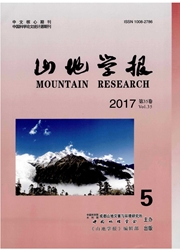

 中文摘要:
中文摘要:
中国的生态补偿实施主要通过制度安排进行。在内蒙古农牧交错带,生态补偿主要通过两种模式进行,即对农牧户放弃土地使用和生产结构调整给予补偿。基于详尽的野外调查,本研究对农牧户经济受偿意愿进行了对比分析,并对两种生态补偿模式的效应进行了详细评价。结果表明,放弃土地使用的生态补偿模式缺乏创造就业机会的机制,因此不具有可持续性。与此相反,调整生产结构的补偿方式不但使农户从事农牧业的规模有了明显下降,而且有助于创造更多的就业机会。虽然这种模式会使农户面临很大的市场风险,但是它为解决区域生态系统恢复和社会经济发展之间的矛盾提供了一种有效方法。
 英文摘要:
英文摘要:
Ecological compensation or eco-compensation has been implemented mainly through institutional arrangement in China. In the farming-pastoral transitional zone of Inner Mongolia, eco-compensation has been implemented in two modes, one for land use abandonment and the other for productionstructure adjustment. Based on a detailed field survey, this study performs a comparative analysis of the willingness of households to accept economic compensation and consequently evaluates the effects of the two eco-compensation modes. The mode of eco-compensation for land use abandonment lacks a mechanism for generating employment opportunities and so is unsustainable. In contrast, ecocompensation for production-structure adjustment makes the pastoral and farming scales of households decrease significantly and most importantly helps to generate more job opportunities. Although this mode faces households with more market risk, it provides an effective means for resolving conflicts between ecosystems restoration and regional socio-economic development.
 同期刊论文项目
同期刊论文项目
 同项目期刊论文
同项目期刊论文
 Least action principle, equilibrium states, iterative adjustment and the stability of river channels
Least action principle, equilibrium states, iterative adjustment and the stability of river channels Rehabilitation of a debris-flow prone mountain stream in southwestern China – Strategies, effects an
Rehabilitation of a debris-flow prone mountain stream in southwestern China – Strategies, effects an An experimental research on optimization of trajectory bucket for spillway tunnel outlet at Sanlipin
An experimental research on optimization of trajectory bucket for spillway tunnel outlet at Sanlipin The hydraulic geometry of narrow and deep channels; evidence for flow optimization and controlled pe
The hydraulic geometry of narrow and deep channels; evidence for flow optimization and controlled pe Variability of effective discharge for suspended sediment transport in a large semi-arid river basin
Variability of effective discharge for suspended sediment transport in a large semi-arid river basin 期刊信息
期刊信息
